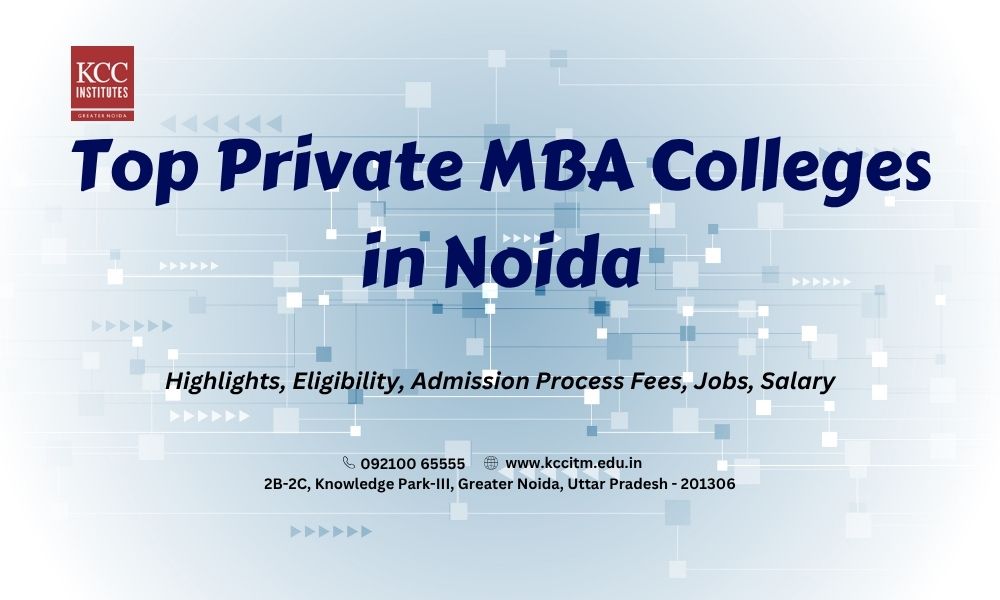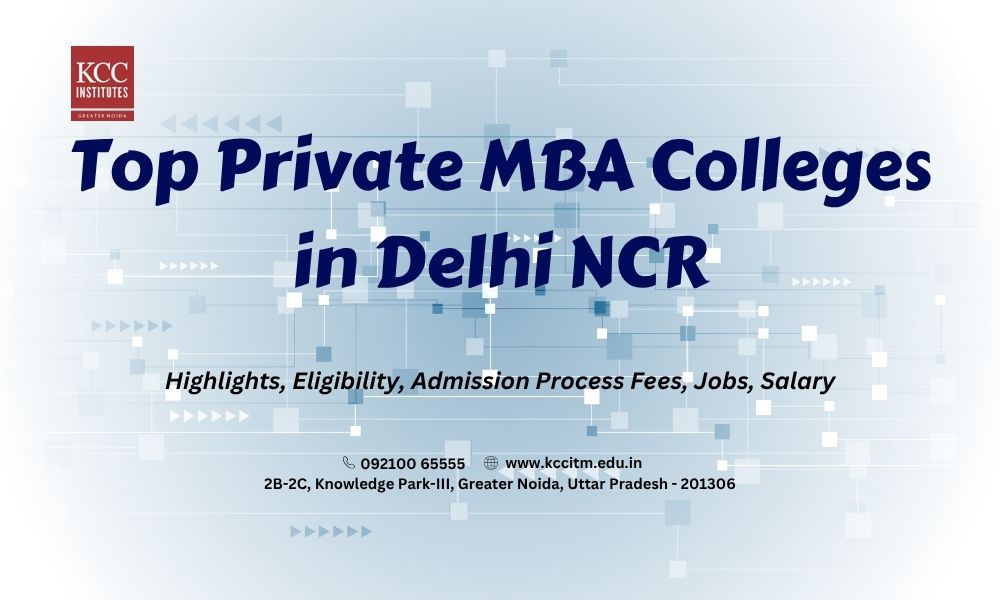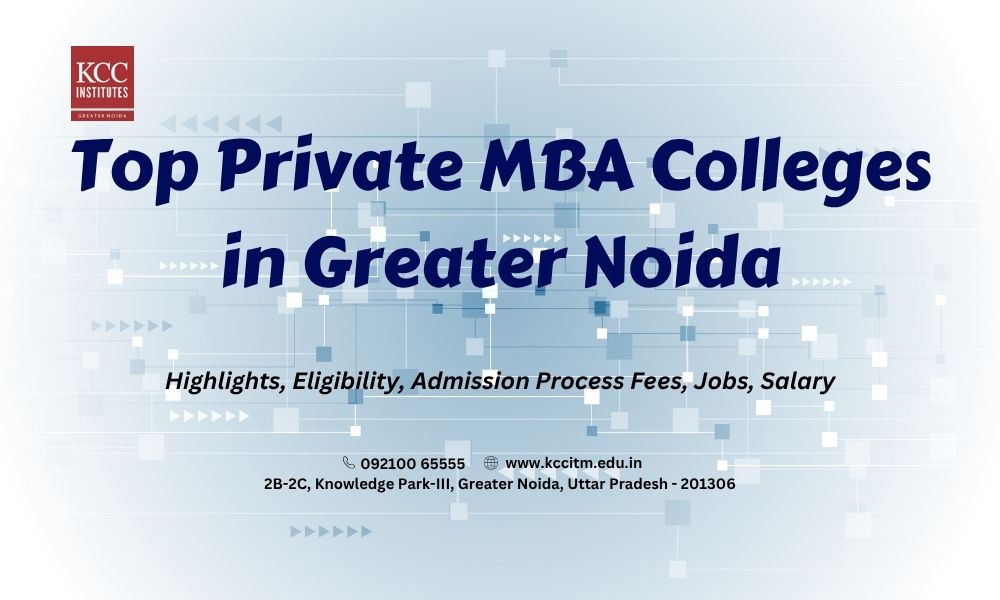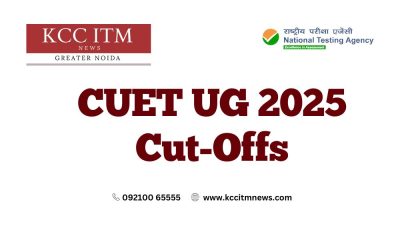Admission in MBA Colleges in Delhi NCR
Deciding to take an MBA degree is a life-changing moment in any career. The Delhi NCR region has come up as a leading region where students and working professionals in India have grabbed the area of quality management education. With a mix of industry exposure, academic excellence, and placement opportunities, admission to MBA colleges in Delhi NCR has become increasingly competitive and desirable.
Delhi being a high place where there is also a high-ranking MBA Institute, it is important to know how the Admission System will happen in India, or say in Delhi. It is also important that you know where to get the colleges that accept the MAT Exam Result. This blog takes you through all the crucial information-admission process, the entrance tests, qualification, and the gist that you can expect when you pursue an MBA course in the Delhi NCR area.
What Are the Reasons to Select the MBA Colleges in Delhi NCR?
Delhi NCR is the area with cities, including Delhi, Noida, Greater Noida, Gurugram, and Ghaziabad, which can prove to be a fruitful ground for management aspirants. Here’s why:
• Immense educational biosphere: There are numerous elite MBA colleges in Delhi NCR along with various areas of specialization, such as Finance, Marketing, HR, and Business Analytics etc.
• Nearness to industry: With the presence of many startups, corporates, and MNCs, there is a lot of opportunity in this region in terms of internships and placements.
• Multicultural and professional diversity: Students find the region quite diverse, as many nationalities can be found here.
Are you a new graduate or a working professional looking to get a career enhancement? An MBA Institute in Delhi can provide you with the right foundation.
Understanding the Admission Process
Admission to the MBA colleges in Delhi NCR is normally a multi-staged selection system. This is the way it goes most of the time:
1. The Eligibility Criteria
Eligibility norms are similar in most of the colleges in Delhi NCR:
• The degree must be at a bachelor level (any field) at a known university
• At least 50 percent in aggregate (45 percent in reserved categories)
• Those students in final year of graduation may on the basis of gradation paper.
In case you propose to apply under MAT Exam Result, then you will want to be sure to verify the exact cut-off and point prerequisites of the colleges that you prefer to get information about.
2. Take a Test of Admission
MBA admission is done through entrance examination. Some of the renowned colleges in Delhi NCR receive national level examination like:
• Common Admission Test (CAT)
• TEST (Management Aptitude Test)
• XAT (Xavier aptitude test)
• CMAT ( Common Management Admission Test )
• GMAT
These include MAT Exam Result which most of the MBA colleges in the region accept. This test is administered several times in a year, so moms have a flexible option of taking this.
When you are targeting an MBA Institute in Delhi accepting MAT, be sure that you do well in all those sections Language Comprehension, Mathematical Skills, Data Analysis & Sufficiency, Intelligence & Critical Reasoning and Indian & Global Environment.
3. College Applications Process
After having your MAT Exam Result or any other relative scores of any other type of exam, then the next order of service is to apply to the colleges. You may apply at several schools that would consider your entrance test result. Different colleges can have application portal, date of application and fee payment.
4. Undergo Group Discussion and Personal Interview
The selection process of most of the leading colleges in Delhi NCR includes GD-PI rounds. It is a vulnerable step because they test your communication ability, leadership capability, analytical ability and the general character.
There are also written ability tests (WAT) or case analysis tests which some colleges will do at this stage.
5. Final Offer of admission
Following interviews, colleges analyze candidates in regard to:
• Matriculation examination mark (e.g. MAT exam result)
• Academic performance
• Employment experience (in case of any)
• GD-PI-WAT performance
In case you are selected, you will be offered admission and here, you must reserve the seat by paying the admission fee within the prescribed deadline.
Admission Requirements Documents
In making an application to an MBA Institute in Delhi, the following documents should be ready:
• Scorecard of entrance exams, e.g., of the MAT Exam Result
• Graduation Mark sheets and certificates
• Class 10th and 12 mark sheets
• Proof of identity (Aadhaar, Passport, Voter ID, etc.)
• Passport-size photographs
• Certification of work experience (where any)
Category certificate (in case it applies)
It is better to have photocopies as well as original documents to prevent last-minute inconveniences.
Specializations of MBA
A broad variety of specialization options, according to the different career interests, is also available in most MBA colleges of Delhi NCR. There are the following popular options:
• Marketing Management
• Finance
• Human resource management
• Business Analytics
• International Business
• Operations Management
• Information Technology
These concentrations assist students in personalizing their MBA experience to their career objectives. No matter whether you want to work corporately, become an entrepreneur, or even work in the government, there will be a specialization to support your desires.
Fee Structure and Scholarships
The tuition of MBA colleges in Delhi NCR ranges between INR 2 lakhs to INR 20 lakhs throughout the course, depending on the college infrastructure, faculty, placement performance, and reputation.
• Reputed institutes have some scholarships based on:
• Results of entrance examinations (such as a good MAT Exam Result)
• Academic performance
• Financial need
• Special category (e.g. SC/ST/OBC)
Whenever going through the admission procedure, always inquire about possible scholarships and financial aid.
MBA Placement Opportunities
Access to the best recruiters is one of the greatest benefits of pursuing studies in any of the MBA institutes in Delhi. Delhi NCR is heavily corporate, and companies present in it provide opportunities in:
• Consulting
• Sales and Marketing
• Business Development
• Finance and Banking
• IT & Operations
• E-commerce & Retail
Even placement tie-ups with international colleges are considered in some colleges and this puts the students at an advantage globally.
Tips to Get Admission in Top MBA Colleges in Delhi NCR
• Start early: In case you want to consider entrance tests such as MAT or CAT, then you should plan at least 6 to 9 months.
• College-wise Shortlisting: Select the schools based on the basis as ROI, specialization, location, and alumni network.
• Soft skills: GDs and PIs can either make or break you; make it something you practice.
• Be Smart with Your MAT Exam Score: Apply to an aspirational, moderate, and safe set of MAT-accepting colleges.
To Up-To-Date: Do not miss major application, entrance examinations, and interview deadlines.
Conclusion
Investing in an MBA is a long-term commitment to your career, and college selection is crucial. If it is academic excellence, placement assistance, and an insight into the industry, an MBA institute in Delhi or any other city in the NCR can perform the magic to secure a great and promising future.
That is why, since you plan to apply this year, prepare your MAT Exam Result, browse as much as you can, and jump. Future leaders like you are awaited by the best colleges of MBA colleges in Delhi NCR.

MBA
Private MBA Colleges in Noida

Private MBA Colleges in Noida – Why Noida, Fee Structure, Seat Intake, Eligibility, Admission, Salary, Rankings
Noida is a city of dreams for Indian students looking for a top-notch, globally recognized education. The city is a veritable utopia, especially for those aspiring to earn an MBA. Private MBA colleges in Noida provide all the things you would anticipate from prestigious universities worldwide, including a thriving campus culture, top-notch facilities, academic brilliance, knowledgeable teachers, and an engaging campus life.
Noida is a great place for students pursuing a full-time MBA degree because of its safe atmosphere and affordable cost of living. More than 40 respected MBA colleges with a range of management and marketing programs can be found in Noida. Five of these institutions are overseen by public or governmental organizations, and the remaining 27 are privately held. MAT, CAT, CMAT, and XAT are among the leading entrance examinations that are accepted by the best private MBA colleges in Noida.
Among the most well-known are Amity University, Jaypee Business School, Amity Business School, Institute of Management Studies, KCC Institute of Technology and Management, Shiv Nadar University, Galgotias University, Noida Institute of Engineering and Technology, IIMT, Sharda University, JSS Academy of Technical Education, Lloyd Business School, GL Bajaj, and Noida International University.
We will discuss all of the private MBA colleges in Noida in the content below because choosing the best one for your MBA might have a big impact on your career. The top 10 private MBA colleges in Noida with affordable tuition and strong placement rates are highlighted in this article. Let’s get started!
You will understand by the end of this blog.
• Rankings, costs, seat intake, and well-liked specializations are the main features of the private MBA colleges in Noida.
• The eligibility criteria, entrance examinations, and their necessity for admission at the best private MBA colleges in Noida.
• The career options and average salary packages after an MBA in Noida, together with information on top recruiters.
Top Private MBA Colleges in Noida: Major Highlights
Some of the top private MBA colleges in Noida are found in the Gautam Buddha Nagar district of Uttar Pradesh, which is a part of the Delhi NCR area. The city has top-notch infrastructure, high-quality education, and numerous modern amenities. Check out the major statistics of the top private MBA colleges in Noida:
| Parameters | Details |
| Number of MBA Colleges | 40+ |
| Average Annual Fees | INR 1.5 – 11 lakhs |
| Top MBA Colleges in Noida | Amity University Noida
Jaypee Business School Institute of Management Studies KCC Institute of Technology and Management, etc. |
| Top MBA Specialisations | MBA in Finance
MBA in Human Resources MBA in Sales and Marketing MBA in Operations MBA in Business Analytics, etc. |
| Accepted Entrance Exams | CAT, XAT, CMAT, MAT, NMAT, GMAT, ATMA |
Why Get Your MBA in Noida?
Higher education, particularly in management, is quickly moving to Noida. This location provides an atmosphere that is favourable for both professional and academic development because it is close to the National Capital Region (NCR), a significant economic and industrial centre. With so many tech parks, business incubators, and global corporations, Noida offers students a wealth of networking and practical experience opportunities.
Important things to take into account when selecting an MBA College
• Ranking and Accreditation: Seek out universities with accreditation from organizations such as the NBA, UGC, and AICTE. To guarantee high-quality education, top rankings and industry recognition are crucial.
• Specializations Offered: Select an institution that offers the appropriate specialization based on your career objectives.
• Industry Links: You will have higher chances for networking, internships, and placements at institutions with close ties to the business sector.
• Facilities and Infrastructure: Verify whether there are any contemporary resources available that can improve your educational experience, such as computer laboratories, libraries, and sports facilities.
• Placement Records: Verify whether the college has a solid history of landing students in prestigious companies.
Best Private MBA Colleges in Noida
This is a comprehensive list of the top 10 private MBA colleges in Noida along with their fee structure, seat intake, eligibility criteria, and average package.
| Private Colleges | Total Fees/Seats | Eligibility / Exams | Average Salary |
| Amity University Noida | INR 6.4-26.4 Lakh
Seats: 500 |
Graduation: 50%
MAT, XAT, CAT, NMAT, CMAT, GMAT, CUET-PG |
INR 6.5 LPA |
| Galgotias University | INR 90K-6.3 lakh
Seats: 900 |
Graduation: 50%
CAT, MAT, CUET PG, NMAT, CMAT, CUET |
INR 3.5 LPA |
| Noida Institute of Engineering and Technology | INR 2.1-2.4 Lakh
Seats: 300 |
Graduation: 45%
CUET, UPTAC |
INR 4 LPA |
| G.L. Bajaj Institute of Technology and Management | INR 1.33 lakh
Seats: 780 |
Graduation: 50%
CAT, MAT, UPTAC, CUET PG |
INR 4.5 LPA |
| Sharda University | INR 8-10.9 Lakh
Seats: NA |
Graduation: 50%
SUAT, MAT, XAT, CAT, CUET-PG |
INR 6 LPA |
| IIMT Greater Noida | INR 2.7 Lakh
Seats: 120 |
Graduation: 50%
MAT, CAT, CUET-PG |
INR 4.8 LPA |
| Shiv Nadar University | INR 4.8-13.1 Lakh
Seats: NA |
Graduation: 60%
XAT, CAT, NMAT |
INR 17.9 LPA |
| Noida International University | INR 3.7 – 5.4 Lakh
Seats: NA |
Graduation: 50%
CUET-PG, NSAT, MAT, XAT, CAT |
INR 3 LPA |
| KCC Institute of Technology and Management | INR 2.60 Lakh
Seats: 240 |
Graduation: 50%
MAT, XAT, CAT, CMAT |
INR 8 LPA |
| Jaypee Business School | INR 11 lakh
Seats: 120 |
Graduation: 50%
MAT, XAT, CAT, CMAT, ATMA, CUET PG |
INR 12 LPA |
| Institute of Management Studies | INR 4 Lakh
Seats: 120 |
Graduation: 50%
CUET PG |
INR 6 LPA |
| JSS Academy of Technical Education | INR 1.3 Lakh
Seats: 120 |
Graduation: 50%
CUET PG, CUET |
INR 4 LPA |
| Lloyd Business School | INR 3.25 Lakh
Seats: |
Graduation: 50%
GMAT, MAT, CUET PG, CAT, ATMA |
INR 8 LPA |
Amity University Noida
Amity University is one of the most prominent private MBA Colleges in Noida. It provides a thorough MBA curriculum with HR, marketing, finance, and other specializations. It offers a global campus atmosphere combined with modern infrastructure, modern libraries and laboratories, and a strong emphasis on innovation and research. Companies like Deloitte, TCS, and Infosys recruit MBA graduates from Amity University, Noida.
Amity University, which was founded in Noida in 2005, has an A+ rating from the NAAC for higher education. It is a distinguished educational institution that has won numerous honours, recognitions, and awards from organizations such as WASC, AICTE, and ACU. PG students can enroll in a full-time MBA program at Amity University.
• Established: 2005
• Accreditation: UGC, NAAC A+, BCI, NCTE, MST, CCB, IET, UNWTO
• Affiliation: None
• MBA Tuition Fee: INR 6.4-26.4 Lakh
• Average MBA Salary: INR 6.5 LPA
• MBA Specializations: Entrepreneurship, HRM, International Business, Marketing, Marketing and Sales Management, Real Estate and Urban Infrastructure, Retail, etc.
• Eligibility: Graduation: 50% – Entrance Exams: CAT, XAT, MAT, CUET PG, NMAT, CMAT, GMAT, CUET
• Total Seats: 500
• Official Website: https://www.amity.edu/index.aspx
Galgotias University
Founded in 2011, Galgotias University is a distinguished and prestigious university that offers degrees in several subjects, including management, and is accredited by the UGC and AICTE. The NAAC has awarded the university an A+ rating. An AICTE-approved MBA program with more than 10 specialization options is available to management students at Galgotias University.
In addition to offering students industry-oriented training, the university offers management students a comprehensive and perceptive learning experience thanks to its first-rate facilities, pedagogical tools, and technological equipment, as well as its knowledgeable teachers. After a student completes their degree, GU’s placements are also quite successful in providing them with a satisfactory return on investment.
• Established: 2011
• Accreditation: PCI, BCI, INC, COA, NCTE, UGC, NAAC, and NCHM
• Affiliation: None
• MBA Tuition Fee: INR 90K-6.3 Lakh
• Average MBA Salary: INR 3.5 LPA
• MBA Specializations: Tourism and travel management, financial management, agribusiness management, and aviation management.
• Eligibility: Graduation: 50-60% – Entrance Exams: CUET-PG, MAT, CAT, NMAT, CMAT, CUET
• Total Seats: 900
• Official Website: https://www.galgotiasuniversity.edu.in/
Noida Institute of Engineering and Technology
The City Educational & Social Welfare Society oversees the Noida Institute of Engineering and Technology, or NIET, which has UGC recognition. It has both NBA and NAAC grade ‘A’ accreditation and was founded in 2001. The MBA program at NIET Noida is open to 300 students. The program lasts for two years in total.
On the list of the top 10 private MBA colleges in Noida, this is among the best institutions. The goal of the NIET MBA program is to provide students with the knowledge and abilities necessary to succeed as managers and leaders. It places a strong emphasis on hands-on learning and provides a wealth of opportunities for students to gain practical experience through industry partnerships and practical projects.
• Established: 2001
• Accreditation: UGC, NAAC, NBA, AICTE
• Affiliation: AKTU
• MBA Tuition Fee: INR 2.1-2.4 Lakh
• Average MBA Salary: INR 4 LPA
• MBA Specializations: Finance, Digital Marketing, Marketing, HRM, Operations, etc.
• Eligibility: Graduation: 45% – Entrance Exams: CUET PG, UPTAC
• Total Seats: 300
• Official Website: https://www.niet.co.in/
G.L. Bajaj Institute of Management and Research
The MHRD and national statutory agencies such as the UGC, NCTE, AICTE, and others have recognized the G.L. Bajaj Institute of Management and Research, which was founded in Noida in 2007. The AICTE-approved MBA program provided here offers eight specialization options, allowing students to choose between a major and a minor specialization or dual specialization.
The institute’s placement cell is well known for collaborating with leading companies and multinational corporations to provide a variety of interesting and fulfilling career possibilities with competitive CTCs.
Below are further details regarding GLBIMR’s MBA program:
• Established: 2007
• Accreditation: NBA, AICTE
• Affiliation: AKTU
• MBA Tuition Fee: INR 1.33 Lakh
• Average MBA Salary: INR 4.5 LPA
• MBA Specializations: General MBA, Business Analytics, etc.
• Eligibility: Graduation: 50% – Entrance Exams: CUET PG, UPTAC, MAT, CAT
• Total Seats: 780
• Official Website: https://www.glbitm.org/
Sharda University
Since its founding in 1996, the Sharda School of Business Studies, a division of Sharda University, has grown to become one of the top private MBA colleges in Noida. It is a well-known university that grants students an MBA degree approved by the AICTE. The program’s course material has been developed with a solid theoretical foundation and the most recent industry requirements in mind.
Candidates with legitimate results on tests like the CAT, MAT, and XAT are also accepted by the university, which also administers its own entrance exam, the Sharda University Admission Test (SUAT), to choose students for the course. Both placement help and campus options following degree completion are included in the university’s placement services. Its MBA graduates had a 100% placement rate in recent years.
• Established: 2009
• Accreditation: UGC, NAAC, NBA, State Government, MCI, AIU, DCI, PCI, COA, INC, Council of Architecture, BCI
• Affiliation: AKTU, ACU, B.R. Ambedkar University
• MBA Tuition Fee: INR 8-10.9 Lakh
• Average MBA Salary: INR 6 LPA
• MBA Specializations: Banking & Finance, Business Analytics, Entrepreneurship & Family Business, Health Care & Hospital Administration, Human Resources Management, International Business, Marketing Management, Supply Chain Management & Logistics, MBA – Dual Specialization, and Executive MBA
• Eligibility: Graduation: 50% – Entrance Exams: SUAT, MAT, XAT, CAT, CUET-PG
• Total Seats: NA
• Official Website: https://www.sharda.ac.in/
IIMT Noida
Founded in 2006 in Greater Noida, the Indian Institute of Management and Technology (IIMT) is an AICTE-approved institution. It has accreditations from AICTE, NBA, BCI, PCI, and other organizations, and it is associated with AKTU. The IIMT College of Engineering’s Department of Management offers the management programs here. The IIMT offers a two-year full-time MBA program with specializations in six management fields that have been authorized by the AICTE as legitimate professional courses.
Applicants can apply here if they pass the MAT or the state entrance exam (UPSEE MBA). The program’s course fees are affordable (INR 2.5 lakhs for two years), and the placements made through campus selection provide a great return on investment once the degree is completed.
• Established: 1994
• Accreditation: BCI, PCI, AICTE, NBA, NAAC
• Affiliation: AKTU, BTE, CCS
• MBA Tuition Fee: INR 2.70 Lakh
• Average MBA Salary: INR 4.88 LPA
• MBA Specializations: Marketing, HR, information technology, international business, operations, and finance.
• Eligibility: Graduation: 50% – Entrance Exams: MAT, CAT, CUET-PG
• Total Seats: 120
• Official Website: https://www.iimtindia.net
Noida International University
Noida International University (NIU) is one of the best private MBA Colleges in Noida, founded in 2010 under the aegis of The Maruti Educational Trust. It is a reputable university with accreditations from organizations like the UGC, BCI, NCTE, and others. It belongs to the AIU as well. It provides a two-year, full-time MBA program through NIU’s School of Business Management.
Students are chosen for the course depending on how well they do on tests such as the CAT, MAT, or XAT. This course offers seven specializations, such as retail management, business analytics, HRM, marketing, and finance. When compared to other private MBA colleges in Noida, NIU’s MBA fees, which range from INR 90,000 to INR 1,05,000, are the most reasonable. The return on investment (ROI) at NIU is also very appealing, with average placements reaching INR 4,50,000.
• Established: 2010
• Accreditation: UGC, the Council of Architecture, the Indian Association of Physiotherapists, the Indian Nursing Council, the National Medical Commission, BCI, NCTE, IIC,
• Affiliation: AIU
• MBA Tuition Fee: INR 3.7 – 5.4 Lakh
• Average MBA Salary: INR 3 LPA
• MBA Specializations: Marketing, finance, hospital and health management, HRM, Big Data Analytics, retail, international marketing, pharmaceuticals, dual specializations, and MBA Elite.
• Eligibility: Graduation: 50% – Entrance Exams: XAT, CAT, MAT, CUET PG, NSAT
• Total Seats: NA
• Official Website: https://niu.edu.in/
Shiv Nadar University
MBA is one of the most popular courses offered by the Shiv Nadar University in the discipline of management. The course lasts for two years and is divided into four semesters. Through the School of Management & Entrepreneurship, the university offers two additional MBA programs in addition to the standard MBA: Global MBA and MBA Analytics.
This reputable institution, which is situated in Greater Noida, was founded in 2011 by the UP state government under the Shiv Nadar institution Act. The Shiv Nadar Foundation established SNU Noida, which has received UGC approval and NAAC accreditation with an A grade.
• Established: 2011
• Accreditation: UGC, NAAC
• Affiliation: Independent
• MBA Tuition Fee: INR 4.8-13.1 Lakh
• Average MBA Salary: INR 17.9 LPA
• MBA Specializations: MBA Global, General MBA, and MBA in Analytics.
• Eligibility: Graduation: 60% – Entrance Exams: XAT, CAT, NMAT
• Total Seats: NA
• Official Website: https://snu.edu.in/
KCC Institute of Technology and Management
KCC ITM, which was founded in 2018, offers a supportive learning environment together with industry-academic interaction, international exposure, and a robust alumni network. Students are prepared to become competent leaders and managers in the corporate sector, and it provides a platform for complete development.
It is accredited by the AICTE and affiliated with AKTU. The MBA at KCC ITM comes in a total of 6 specializations including HRM, Operations, Finance, Marketing, IT, and International Business.
• Established: 2009
• Accreditation: AICTE
• Affiliation: AKTU
• MBA Tuition Fee: INR 2.60 Lakh
• Average MBA Salary: INR 8 LPA
• MBA Specializations: HRM, Operations, Finance, Marketing, IT, and International Business.
• Eligibility: Graduation: 50% – Entrance Exams: CAT, MAT, CMAT, XAT
• Total Seats: 240
Institute of Management Studies
IMS Noida is ranked among the top 10 private MBA colleges in Noida. It offers a dual full-time MBA program focused on enhancing students’ employment chances and operational skills. A broad range of subjects covering key business domains like finance, marketing, operations, human resources, and information technology are covered in this program.
• Established: 1998
• Accreditation: UGC, NAAC
• Affiliation: CCS
• MBA Tuition Fee: INR 4 Lakh
• Average MBA Salary: INR 8 LPA
• MBA Specializations: MBA General
• Eligibility: Graduation: 50% – Entrance Exams: CUET PG
• Total Seats: 120
• Official Website: https://www.imsnoida.com
Eligibility for Private MBA Colleges in Noida
The following are often the prerequisites for admission to private MBA colleges in Noida:
Understanding the prerequisites is crucial before applying to an MBA college in Noida. To make sure students are ready for the course, the majority of universities have comparable eligibility requirements. These consist of your educational background, results from entrance exams, and other elements that influence your eligibility for admission.
To apply to the most affordable MBA programs, you must fulfil the following common qualifying requirements:
Eligibility for Education:
A minimum of 50% in a bachelor’s degree. (For applicants who are PWD, SC, or ST, there is a 5% relaxation.)
Cut-off Requirements:
Merit lists compiled from undergraduate exam results are used by some universities to screen applicants.
Entrance Exams:
Admission requires passing scores on entrance tests such as the CAT, MAT, CMAT, NMAT, etc.
Maximum Age:
When applying to these universities’ MBA programs, there is no maximum age limit.
The MBA College Admissions Process in Noida
Candidates must apply via the official website of the relevant university and fulfil the minimal eligibility standards to be admitted to private MBA colleges in Noida.
An overview of the fundamental admissions procedure for MBA colleges in Noida may be found below:
Submit an Admission Application
Apply online by going to the college’s official website.
Admission Test
Take the college entrance exam or an entrance exam that the institution accepts at the national level.
The Counseling Process
Depending on their admission exam results, shortlisted students will be invited to take part in the counseling process.
Leading MBA Schools in Noida: Employment Prospects and Benefits
The typical MBA pay for candidates in a variety of industries, including healthcare, finance, accounting, IT management, and more, is displayed in the table below. These top private MBA colleges in Noida are the go-to option for prospective professionals because of their academic diversity and excellent pay opportunities.
| Sector | Average MBA Salary (INR) |
| Healthcare | INR 5,00,000 – INR 12,00,000 |
| Finance | INR 7,00,000 – INR 12,00,000 |
| Accounting | INR 5,00,000 – INR 10,00,000 |
| Operations and Project Management | INR 9,00,000 – INR 14,00,000 |
| IT Management | INR 10,00,000 – INR 16,00,000 |
| E-Business | INR 6,00,000 – INR 9,00,000 |
| International Business | INR 7,00,000 – INR 9,00,000 |
| Real Estate | INR 5,00,000 – INR 8,00,000 |
| Fashion | INR 8,00,000 – INR 12,00,000 |
| Sales and Marketing | INR 8,00,000 – INR 16,00,000 |
Private MBA Colleges in Noida: ROI
One of the main benefits of earning an MBA in the city is the high return on investment that follows graduation. Located in the centre of North India’s economic activity, near the capital city of Delhi and the commercial and economic centre of Gurgaon, the private MBA colleges in Noida have industry connections and partnerships with leading multinational corporations and corporate houses that employ both recent graduates and recent MBA graduates.
| College/Institute | Full Course Fees | Average Placement Package |
| Amity University | INR 2,42,000-INR 11,66,000 | INR 6,41,000 P.A. |
| Galgotias University, Greater Noida | INR 1,95,000 to INR 3,13,000 | INR 5,40,000 P.A. |
| Sharda School of Business Studies | INR 7,10,500 to INR 8,12,000 | INR 45,00,000 P.A. (Highest CTC) |
| IIMT College of Management | INR 2,50,000 | INR 4,88,000 P.A. |
| Lloyd Business School, Greater Noida | INR 5,50,000 | INR 6,58,000 P.A. |
| G. L. Bajaj Institute of Management & Research | INR 6,48,000 | INR 8,50,000 P.A. |
| Noida International University | INR 90,000 to INR 1,05,000 | INR 4,85,000 P.A. |
| KCC Institute of Technology and Management | INR 2,60,000 | INR 8,76,000 P.A. |
Conclusion
Recognize the college’s eligibility requirements, entrance exam requirements, and selection procedure. Some of the private MBA colleges in Noida offer top-notch instruction, competitive placements, and a wide range of specializations. Depending on your professional objectives, you can select from either government or private institutions. Noida is a popular destination for MBA students due to its reasonable tuition and excellent employment prospects. Be sure to do extensive research before choosing a college!
Private MBA Colleges in Noida FAQs
Q1. Is Noida better for an MBA?
There are numerous prestigious private MBA colleges in Noida. The Knowledge Park areas of Greater Noida are home to several prestigious MBA colleges that provide outstanding return on investment and academic assistance.
Q2. Which Noida institution offers the best MBA programs?
According to the NIRF 2024 Management ranking, Amity University holds the 29th position among the best MBA Colleges in Noida.
Q3. How much does an MBA from Noida cost?
Since there are only private MBA colleges in Noida, the cost of an MBA degree is rather higher, ranging from INR 1 million to INR 15 lakhs. This is the typical cost range for an MBA program in Noida, though the precise amount will differ depending on the institution.
Q4. Will there be scholarships and fee waivers in the private MBA colleges in Noida?
The majority of private MBA colleges in Noida provide financial aid options, including scholarships, fee waivers or concessions, and instalment payment plans.
Q5. Is Noida a suitable place to get an MBA?
Yes, Noida’s MBA colleges offer competitive employment prospects in prestigious domestic and foreign companies with alluring benefits and compensation packages. MBA students enrolled in campus placements in Noida are provided with starting packages that are reasonably priced and provide an enticing return on investment.
MBA
Private MBA Colleges in Delhi NCR

Private MBA Colleges in Delhi NCR: Rankings, Admission, Eligibility, Fee Structure, Salary, Seat Intake, Career Options
In addition to providing high-quality education, private MBA colleges in Delhi NCR are renowned for their flawless curricula, welcoming facilities, and knowledgeable teachers. Delhi NCR is home to more than 530 MBA colleges, providing various choices from government-sponsored establishments to private colleges and independent business schools. Out of 530 MBA colleges, more than 370 colleges are privately owned, while the rest are either fully or partially Government-owned institutions.
Additionally, many students’ interests are covered by various inclusive MBA specializations. Communication, Economics and Business Policy, Finance and Accounting, International Business, Information Systems, Marketing, and Organizational Behavior are a few of these specializations.
India’s corporate headquarters, government offices, embassies, and global corporations are all incredibly accessible from Delhi NCR. Students have the option to work for any of the aforementioned organizations in their chosen sector. Top private MBA colleges in Delhi NCR are situated in easily accessible neighbourhoods with excellent access to the city’s other districts. Some of the top private MBA colleges in Delhi NCR are Amity University, IIFT, Galgotias, Jamia Hamdard, BVIMR, KCC ITM, etc.
These private MBA colleges in Delhi NCR are consecutively ranked by various organizations, including NIRF and Times, on various quality parameters. International students’ ideal MBA colleges include Amity University Noida, KCC ITM, IIFT, Jamia Hamdard, Galgotias, and several others.
Private MBA Colleges in Delhi NCR: Major Highlights
An MBA is a two-year postgraduate program that includes both advanced and foundational topics in the field of management. Human Resources, Finance, Marketing, Organizational Behavior, Management Principles, and so forth are a few of the most popular MBA specialties. An individual can open up a world of employment options by improving their skills and talents and becoming proficient enough to operate at managerial levels with an MBA degree.
View the following highlights of top 10 private MBA colleges in Delhi NCR:
| Factors | Statistics |
| Total Private MBA Colleges | 10+ MBA colleges |
| Yearly Fees | INR 2-3 lakh: 1 college
INR 3-5 lakh: 1 college INR > 5 lakh: 13 colleges |
| Private MBA Colleges | Amity University, IIFT, Jamia Hamdard, Galgotias, BVIMR, KCC ITM |
| MBA Specialisations | HRM, Operations Management, Sales and Marketing, Finance, Marketing, IT & Systems, etc. |
| MBA Entrance Exams | CAT, MAT, XAT, CMAT, NMAT, etc. |
Why should you choose Delhi NCR for an MBA?
Delhi NCR’s strong corporate presence, top-notch educational institutions, and wide range of employment options make it a great place to get an MBA. The area is the perfect place for management education since it provides a combination of prestigious business schools, a wide range of specializations, and networking opportunities.
Here’s a closer look at the benefits:
• Corporate Hub: With so many start-ups, major companies, and industries based in Delhi NCR, there are many options for internships, live projects, and placements.
• Robust Alumni Network: The top private MBA colleges in Delhi NCR have robust alumni networks, which are beneficial for networking and professional progression.
• Diverse Sectors: For MBA grads, Delhi NCR provides a broad choice of industries and sectors, including marketing, operations, finance, and human resources.
• Dynamic Business Ecosystem: There are many chances to network with alumni, entrepreneurs, and leaders in the sector thanks to the area’s vibrant business environment.
• Events & Conferences: Students have the opportunity to network with possible employers and remain current on industry trends by attending the many conferences, seminars, and job fairs that Delhi NCR hosts.
How to choose the right private MBA colleges in Delhi NCR?
Choosing the best private MBA colleges in Delhi NCR after graduating is not a cakewalk. Despite the large number of options, choosing the best one could be difficult. You’re looking for a job that will offer you great opportunities for advancement and pay well. When choosing a career route, it’s important to think about what excites you.
MBA is one of the most well-liked post-graduate programs, renowned for producing future leaders by creating an atmosphere in the classroom that supports self-directed learning, practical experience, and entrepreneurial pursuits.
The MBA degree program seeks to empower students by offering them a top-notch education with a focus on innovation, entrepreneurship, and benchmarked management practices. Earning a degree from one of the best private MBA colleges in Delhi NCR can provide students with excellent opportunities for both lifestyle and future schooling.
With a wealth of alternatives, the National Capital Region (NCR) serves as a centre for business and education. Here is a thorough guide to help you make an informed choice so you can successfully traverse the options. The following are crucial factors to take into account when selecting the top MBA colleges in Delhi NCR, according to top rankings:
Accreditation and Recognition:
Seek out universities that have received accreditation from reputable organizations. The institution’s accreditation guarantees that it satisfies certain requirements for high-quality instruction. Additionally, ascertain whether the college is affiliated with a reputable university. The validity of the MBA program is increased by accredited associations.
Check their rankings on both the domestic and national levels:
Annual rankings are released by numerous organizations and media outlets based on factors like academic standing, instructor calibre, facilities, and placement history. Rankings can give useful information about a college’s overall standing, but they are not the only criterion.
Faculty Qualifications:
An important component of the educational standard is the faculty. Check the credentials of each college’s professors. Look for instructors that have worked in the subject, have strong academic records, and have contributed to research. Your educational experience can be greatly enhanced by a faculty member with a broad range of skills and practical experience.
Placement Records:
Find out about the percentage of students placed, the average placement packages, and the kind of companies that come to campus for placements. A college’s dedication to preparing students for the working world is demonstrated by its impressive placement record. It also shows how much the business community believes in the organization.
Alumni Network:
A college’s influence on the professional life of its graduates is demonstrated by an active and significant alumni network. Examine each college’s network of former students and their achievements. A robust network may provide you with enlightening knowledge, mentorship opportunities, and a supportive community throughout your career.
Reviews and Comments:
Consult internet reviews and get feedback from both current and past students. They can help you better understand the investment you are making. Alumni can talk about their experiences after graduation and provide advice on how to handle the real-world challenges of entering the workforce.
Top Private MBA Colleges in Delhi NCR
We have created a list of the top private MBA colleges in Delhi NCR to give you a head start in your search for the right college. The list also includes their NIRF rankings, eligibility criteria, seat intake, and salary packages.
| College Names | NIRF 2024 | Total Fees/Seats | Eligibility / Exams | MBA Salary |
| Amity University Noida | 29 | INR 6.4-26.4 Lakh
Seats: 500 |
Graduation: 50%
MAT, XAT, CAT, NMAT, CMAT, GMAT, CUET-PG |
INR 6.5 LPA |
| Jamia Hamdard | 78 | INR 5.2 Lakh
Seats: 180 |
Graduation: 50%
MAT, XAT, GMAT, CAT, CMAT, ATMA, GPAT |
INR 5.5 LPA |
| BML Munjal University | 83 | INR 14.6–20 Lakh
Seats: 750 |
Graduation: 50%
MAT, XAT, CMAT, CAT, NMAT, UGAT, CUET PG, SAT |
INR 9 LPA |
| Galgotias University | 98 | INR 90K-6.3 Lakh
Seats: 180 |
Graduation: 50-60%
CUET-PG, MAT, CAT, NMAT, CMAT, CUET |
INR 3.5 LPA |
| BVIMR New Delhi | – | INR 6.5 Lakh
Seats: 180 |
Graduation: 50%
BMAT |
INR 7 LPA |
| Banarsidas Chandiwala Institute Of Professional Studies, New Delhi | – | INR 2.47 Lakh
Seats: 121 |
Graduation: 50%
CAT, CMAT, IPU CET |
INR 3.1 LPA |
| Rukmini Devi Institute of Advanced Studies | – | INR 3.3 Lakh
Seats: 180 |
Graduation: 50%
CAT, CMAT, IPU CET |
INR 3.5 LPA |
| Noida Institute of Engineering and Technology | – | INR 2.1-2.4 Lakh
Seats: 300 |
Graduation: 45%
CUET, UPTAC |
INR 4 LPA |
| G.L. Bajaj Institute of Technology and Management | – | INR 1.33 lakh
Seats: 780 |
Graduation: 50%
CAT, MAT, UPTAC, CUET PG |
INR 4.5 LPA |
| KCC Institute of Technology and Management | – | INR 2.60 Lakh
Seats: 240 |
Graduation: 50%
MAT, XAT, CAT, CMAT |
INR 8 LPA |
Amity University Noida
Students can apply for admission to Amity University in Noida if they have passed the CAT, MAT, XAT, CMAT, GMAT, or NMAT entrance exams. Finance, Human Resources, Marketing and Sales, Technology Management, and Entrepreneurship are the top MBA programs offered by Amity University. Students in the general category pay between INR 6.4 Lakh to INR 26.36 Lakh in fees.
• Established: 2005
• Accreditation: UGC, NAAC A+, BCI, NCTE, MST, CCB, IET, UNWTO
• Affiliation: None
• MBA Tuition Fee: INR 6.4-26.4 Lakh
• Average MBA Salary: INR 6.5 LPA
• MBA Specializations: Entrepreneurship, HRM, International Business, Marketing, Marketing and Sales Management, Real Estate and Urban Infrastructure, Retail, etc.
• Eligibility: Graduation: 50% – Entrance Exams: CAT, XAT, MAT, CUET PG, NMAT, CMAT, GMAT, CUET
• Total Seats: 500
• Official Website: https://www.amity.edu/index.aspx
Jamia Hamdard University
Jamia Hamdard (JHU) is ranked 50th for BCA by India Today 2024, 62nd for Overall by NIRF 2024, and 78th for Management by NIRF 2024. Jamia Hamdard University is one of the best private MBA colleges in Delhi, born in 1989, and approved by UGC with a Grade “A” rating from NAAC.
Admission to the Jamia Hamdard MBA program is determined by the candidate’s performance on the recognized tests, including CAT, CMAT, MAT, GMAT, XAT, GPAT, and ATMA. Candidates who are chosen must proceed to the round of group discussions and personal interviews.
• Established: 1989
• Accreditation: UGC, NAAC A+
• Affiliation: None
• MBA Tuition Fee: INR 5.2 Lakh
• Average MBA Salary: INR 5.5 LPA
• MBA Specializations: Health and Hospital Management, General MBA, Pharmaceutical Management, etc.
• Eligibility: Graduation: 50% – Entrance Exams: MAT, XAT, GMAT, CAT, CMAT, ATMA, GPAT
• Total Seats: 180
• Official Website: https://www.jamiahamdard.ac.in/
BML Munjal University (BMU)
In 2014, BML Munjal University (BMU) was founded. Among the top private universities in Delhi-NCR is this one. It is a member of the Association of Indian Universities (AIU) and has been recognized by the University Grants Commission (UGC). BMU has the approval of the UGC and is ranked 83rd in the Management Category of the NIRF Ranking 2024.
In addition to an integrated BBA MBA program, the institute provides an MBA degree in marketing, operations and supply chain management, entrepreneurship, business analytics, finance, HRM, and strategic management.
• Established: 2014
• Accreditation: UGC, AICTE
• Affiliation: None
• MBA Tuition Fee: INR 14.6–20 Lakh
• Average MBA Salary: INR 9.2 LPA
• MBA Specializations: finance, business analytics, HRM, marketing, operations and supply chain management, entrepreneurship, and strategic management, Integrated BBA and MBA.
• Eligibility: Graduation: 50% – Entrance Exams: MAT, XAT, CMAT, CAT, NMAT, UGAT, CUET PG, SAT
• Total Seats: 750
• Official Website: https://www.bmu.edu.in/
Galgotias University
Galgotias University was born in 2011 as a private university in the city of Greater Noida. It is accredited by UGC, PCI, BCI, INC, COA, NCTE, and NCHM. The NAAC A+ Grade attests to the university’s accreditation. According to the NIRF, Galgotias is placed 98th in the management category.
Galgotias University Greater Noida offers a two-year MBA program with a number of specializations, including tourism and travel management, financial management, agribusiness management, and aviation management.
• Established: 2011
• Accreditation: PCI, BCI, INC, COA, NCTE, UGC, NAAC, and NCHM
• Affiliation: None
• MBA Tuition Fee: INR 90K-6.3 Lakh
• Average MBA Salary: INR 3.5 LPA
• MBA Specializations: Tourism and travel management, financial management, agribusiness management, and aviation management.
• Eligibility: Graduation: 50-60% – Entrance Exams: CUET-PG, MAT, CAT, NMAT, CMAT, CUET
• Total Seats: 180
• Official Website: https://www.galgotiasuniversity.edu.in/
BVIMR New Delhi
In 1992, Delhi’s Bharati Vidyapeeth Institute of Management and Research (BVIMR) was founded. BVIMR is certified by ISO 9001:2015 and recognized by the UGC. The NAAC has granted the institute an A+ accreditation.
The institute offers an MBA program with a seat intake of 180, and the total cost of the program is INR 6.5 Lakh.
• Established: 1992
• Accreditation: UGC, NAAC
• Affiliation: None
• MBA Tuition Fee: INR 6.5 Lakh
• Average MBA Salary: INR 7 LPA
• MBA Specializations: General MBA
• Eligibility: Graduation: 50% – Entrance Exams: BMAT
• Total Seats: 180
• Official Website: https://www.bvuniversity.edu.in/bvimr/
Banarsidas Chandiwala Institute of Professional Studies, New Delhi
Delhi is home to the private Banarsidas Chandiwala Institute of Professional Studies. It was founded in 2008. The two-year MBA/PGDM program at Banarsidas Chandiwala Institute of Professional Studies is provided full-time. Students’ performance in the CAT, CMAT, and IPU CET determines their admission to the MBA/PGDM program at Banarsidas Chandiwala Institute of Professional Studies.
• Established: 2008
• Accreditation: AICTE
• Affiliation: GGSIPU
• MBA Tuition Fee: INR 2.47 Lakh
• Average MBA Salary: INR 3.1 LPA
• MBA Specializations: General MBA
• Eligibility: Graduation: 50% – Entrance Exams: CAT, CMAT, IPU CET
• Total Seats: 121
• Official Website: https://www.bcips.ac.in/
Rukmini Devi Institute of Advanced Studies
In 1999, the Rukmini Devi Institute of Advanced Studies was founded. Delhi is home to this private institution. The institute is accredited by the AICTE and NAAC. The MBA and PGDM programs at Rukmini Devi Institute of Advanced Studies are provided full-time. Candidates must pass the CAT, CMAT, and IPU CET with respectable scores to meet the eligibility requirements set forth by the Rukmini Devi Institute of Advanced Studies for admission to MBA/PGDM programs.
• Established: 1999
• Accreditation: AICTE, NAAC
• Affiliation: GGSIPU
• MBA Tuition Fee: INR 3.3 Lakh
• Average MBA Salary: INR 3.5 LPA
• MBA Specializations: General MBA
• Eligibility: Graduation: 50% – Entrance Exams: CAT, CMAT, IPU CET
• Total Seats: 180+121
• Official Website: https://rdias.ac.in
Noida Institute of Engineering and Technology
The Noida Institute of Engineering and Technology, or NIET, is governed by the City Educational & Social Welfare Society and is recognized by the UGC. It was established in 2001 and has both NBA and NAAC grade ‘A’ accreditation. At NIET Noida, 300 students can enroll in the MBA program. The program lasts for a total of two years.
• Established: 2001
• Accreditation: UGC, NAAC, NBA, AICTE
• Affiliation: AKTU
• MBA Tuition Fee: INR 2.1-2.4 Lakh
• Average MBA Salary: INR 4 LPA
• MBA Specializations: Finance, Digital Marketing, Marketing, HRM, Operations, etc.
• Eligibility: Graduation: 45% – Entrance Exams: CUET PG, UPTAC
• Total Seats: 300
• Official Website: https://www.niet.co.in/
G.L. Bajaj Institute of Technology and Management
Established in 2007, GL Bajaj Institute of Technology and Management is a private university located in Greater Noida. The institute has received approval from the AICTE, the Ministry of HRD, and the Indian government. Formerly known as UPTU Lucknow, GL Bajaj is affiliated with Dr. APJ Abdul Kalam Technical University and has received National Board of Accreditation (NBA) accreditation.
Four semesters make up the two-year post-graduation GL Bajaj Noida MBA program, which is offered full-time. Additionally, the institute offers regular MBA courses.
• Established: 2007
• Accreditation: NBA, AICTE
• Affiliation: AKTU
• MBA Tuition Fee: INR 1.33 Lakh
• Average MBA Salary: INR 4.5 LPA
• MBA Specializations: General MBA, Business Analytics, etc.
• Eligibility: Graduation: 50% – Entrance Exams: CUET PG, UPTAC, MAT, CAT
• Total Seats: 780
• Official Website: https://www.glbitm.org/
KCC Institute of Technology and Management
In 2009, the renowned KCC Institute of Technology and Management was established in Greater Noida, Uttar Pradesh, by the KCC Group of Institutions. The institute is private, affiliated with AKTU, and approved by the AICTE.
HRM, Operations, Finance, Marketing, Information Technology, and International Business are just a few of the many specializations in which KCC ITM offers 2-year MBA+ programs. In addition, it provides multiple value-added qualifications and dual specialization.
• Established: 2009
• Accreditation: AICTE
• Affiliation: AKTU
• MBA Tuition Fee: INR 2.60 Lakh
• Average MBA Salary: INR 8 LPA
• MBA Specializations: HRM, Operations, Finance, Marketing, IT, and International Business.
• Eligibility: Graduation: 50% – Entrance Exams: CAT, MAT, CMAT, XAT
• Total Seats: 240
• Official Website: https://kccitm.edu.in/
Top Private MBA Colleges in Delhi NCR: Admissions 2025
The following are the general requirements for admission to a private MBA program in Delhi NCR:
• A bachelor’s degree or its equivalent in any discipline from an accredited university or institution with at least a 50% aggregate is required of candidates.
• The results of national admission tests like the CAT, MAT, XAT, and others are taken into account by a large number of MBA colleges in Delhi NCR. The minimum cut-off scores established by the individual universities must be met by candidates.
Top MBA Colleges in Delhi NCR with Best Placement
One of the main things a student thinks about before deciding to enroll in an MBA program is placements. The top MBA colleges in Delhi NCR assist deserving students in landing jobs in the world’s top corporations. The students who graduated from the top private MBA colleges in Delhi NCR were given quite alluring placement offers.
| College | Average Package (INR) | Highest Package (INR) | Top Recruiters |
| IIFT Delhi, Indian Institute of Foreign Trade | INR 27.3 LPA | INR 84.5 LPA | HSBC, A.T. Kearney, Oliver Wyman, and Thomson Reuters |
| Jamia Hamdard University | INR 6 LPA to INR 8 LPA | INR 24.5 LPA | Rockwell Automation, Klynveld Peat, Marwick Goerdele, Vedanta Ltd, VE Commercial Vehicles Ltd, Adobe India Pvt Ltd, |
| BML Munjal University | INR 9.40 LPA | INR 25.90 LPA | Amazon, KPMG, Hero, TVS, Hyundai, and Axis Bank |
| Amity University, Noida | INR 8 LPA | INR 54 LPA | EY, Deloitte, KPMG, TCS, Tech Mahindra, HCL Tech, and ICICI Bank. |
| KCC Institute of Technology and Management | INR 6 LPA | INR 25 LPA | Yes Bank, Dabur, ICICI, Tata Steel, JK Group, Amul, Aditya Birla Sunlife, Essel Group, VLCC, and Future Generali |
Conclusion
The curricula offered by the top private MBA colleges in Delhi NCR vary depending on specializations, financial constraints, and professional objectives. There is something for every prospective manager in the region, whether you’re looking for a globally recognized business program from IIFT, a technology-focused curriculum from KCC ITM Greater Noida, or an incredibly economical yet highly respected MBA from Jamia Hamdard University.
Private MBA Colleges in Delhi NCR FAQs
Q1. Can I pursue my MBA directly?
Yes. Each college may have different requirements. Direct MBA admission is available to students at any college in the nation that provides it. Students must have at least 50% of their UG grades to be considered for management quota seats in private MBA colleges in Delhi NCR located throughout different states.
Q2. Is an MBA in Delhi a good option?
An MBA in Delhi is a fantastic decision because there are more possibilities for pursuing an MBA at a reasonable cost with a high return on investment from an MBA college in Delhi. Additionally, because Delhi is a unique national capital, there is a wider corporate interface available.
Q3. What is the best MBA program?
The following are among the top MBA specializations:
• MBA Human Resource Management.
• MBA International Business.
• MBA Banking & Financial Services.
• MBA Business Analytics.
• MBA Rural Management.
• MBA Healthcare Management.
• MBA Agriculture Business Management.
• MBA in Entrepreneurship & Family Business Management.
Q4. Is the CAT exam required for MBA programs?
Yes. No, taking the CAT or CMAT exam is not required for an MBA. Numerous additional MBA entrance tests, such as the XAT, are comparable to or equivalent to the CAT. Entrance exams are offered by several institutions, including NMAT for NMIMS, TISS, SNAP for Symbiosis, IIFT, CET for Maharashtra institutes, MICA, and others.
Q5. In India, which state offers the best MBA programs?
The states with the most applicants for MBA programs are Uttar Pradesh, Maharashtra, Madhya Pradesh, and Andhra Pradesh.
MBA
Top Private MBA Colleges in Greater Noida: Fees, Salary, Eligibility, Seat Intake, Admission

Greater Noida is probably already familiar to you if you’re considering pursuing an MBA and are researching your alternatives in the Delhi-NCR region. This area has quickly grown into one of India’s leading centres for education over the last ten years. Some of the top private MBA colleges in the nation are located in Greater Noida, which offers top-notch facilities, easy access to corporate headquarters, and a contemporary metropolitan lifestyle.
Greater Noida is a lucrative city and home to 70+ MBA colleges. At least one of them is directly run by the Government, while the rest are private ones. While Gautam Buddha University is the sole public university in Greater Noida, the private education sector is riddled with several great names under its tutelage, such as BIMTECH, GLBITM, KCC ITM, Galgotias University, NIET, and GNIOT.
MBA aspirants will be evaluated for admission based on their scores in various entrance exams accepted by the private MBA colleges in Greater Noida, such as XAT, CMAT, MAT, CAT, CUET PG, and ATMA.
Top private MBA colleges in Greater Noida offer MBA programs in various subjects, including information technology, marketing, finance, human resources management, and general management.
• CAT, MAT, XAT, CMAT, and CUET PG are the criteria used for MBA admission in 2025 at private MBA colleges in Greater Noida.
• Depending on the college, the total cost of tuition for MBA programs in Greater Noida might range from INR 1 Lakh to INR 15.5 Lakh.
• The top private MBA Colleges in Greater Noida are Birla Institute of Management Technology and Galgotias University as per the NIRF rankings. They hold the ranks of 64 and 98, respectively in the management category by the NIRF.
• Some of the cheapest private MBA Colleges in Greater Noida are KCC Institute of Technology and Management, GL Bajaj, Indian Institute of Finance, Dronacharya Group of Institutes, Greater Noida Institute of Business Management, RIG Institute of Hospitality and Management, and more.
• The average package at the best private MBA colleges in Greater Noida varies between INR 40 KPA and INR 20 LPA, according to the most recent placement statistics.
In this article, we’ll look at the reasons behind the rise in popularity of MBA programs in Greater Noida, what sets them apart, and why more and more students are choosing this area to establish solid professional foundations. You can get all the necessary information here, whether you’re trying to find private MBA colleges in Greater Noida or are trying to narrow down your list to the top 10.
Top Private MBA Colleges in Greater Noida: Major Highlights
An MBA is an academic curriculum focused on management and marketing. Organizational behaviour, marketing, management principles, supply chain management, operations management, and other topics are covered in this curriculum. Amazon, Apple, Bain & Company, Citigroup, Deloitte, Facebook, Accenture, and others are among the top employers seeking MBA candidates.
Below, we have arranged the number of private MBA colleges according to their fee structure, along with various other factors:
| Particulars | Parameters/Statistics |
| Number of MBA Colleges | 70+ colleges |
| Annual Fees | Less than INR 1 lakh: 1 college
INR 1-2 lakh: 20+ colleges INR 2-3 lakh: 15+ colleges INR 3-5 lakh: 10+ colleges INR > 5 lakh: 30+ colleges |
| Top Colleges | BIMTECH, GL Bajaj Institute of Management and Research, Galgotias University, I Business Institute, NIMT, KCC ITM |
| Top Specialisations | Human Resources, Sales and Marketing, Operations, IT & Systems, etc. |
| Average Salary | INR 4-20 LPA |
| Accepted Entrance Exams | CAT, MAT, XAT, CMAT, etc. |
What is Greater Noida?
Greater Noida is a city within a city with its own unique characteristics and identity. It was founded in January 1991. The city’s creation as an extension of Noida was made possible by the UP Industrial Area Development Act of 1976. The journey from the capital city of New Delhi to Greater Noida will take only 30 minutes.
Greater Noida is made up of 124 villages spread around 38,000 Ha (380 km2). The region is home to a whopping population of 4 Lakh. With a wealth of economic and educational options, Greater Noida is the centre for students. The best region in Greater Noida for MBA education is the Knowledge Park sub-district.
Greater Noida is home to numerous industrial companies as well as significant industries including banking, media, hotels, tourism, and information technology. Students can take advantage of all the advantages of earning a management degree and getting well-placed at leading multinational corporations.
Why is Greater Noida the top destination for MBA education?
With its world-class infrastructure and tranquil surroundings, Greater Noida is the perfect place to concentrate on your academics and get practical business experience. Numerous establishments in the city are recognized for their faculty, curriculum, and placement assistance, and are considered among the best MBA colleges in Greater Noida.
In addition to being a cutting-edge educational hub, Greater Noida is a wise option for MBA candidates seeking to combine professional experience with academic success. This is the reason:
Proximity to Business Centres
Students have direct access to internships, real-world projects, industry mentorship, and placement chances due to their proximity to important commercial hubs like Noida, Gurugram, and Delhi.
Quality Education at an Affordable Price
Low-cost MBA colleges in Greater Noida offer a great return on investment, in contrast to metro areas where educational costs might be prohibitive. Full-fledged MBA programs are offered by numerous private colleges and universities at comparatively low tuition costs.
Contemporary Facilities and Infrastructure
The city is home to well-designed campuses with libraries, cutting-edge labs, contemporary classrooms, digital learning resources, and plenty of hostel space.
Curriculum Prepared for Industry
The private MBA colleges in this area prioritize a curriculum that is up to date with the latest developments in the sector. Modules on digital marketing, AI in business, data analytics, and leadership training are frequently offered; these are all intended to prepare students for the workforce right away.
Best Private MBA Colleges in Greater Noida
Check out the best private MBA Colleges in Greater Noida along with their tuition fees, average salary, seat intake, eligibility, rankings, and more.
| Private Colleges | Total Fees/Seats | Eligibility / Exams | Average Salary |
| Galgotias University | INR 90K-6.3 lakh
Seats: 900 |
Graduation: 50%
CAT, MAT, CUET PG, NMAT, CMAT, CUET |
INR 3.5 LPA |
| Noida Institute of Engineering and Technology | INR 2.1-2.4 Lakh
Seats: 300 |
Graduation: 45%
CUET, UPTAC |
INR 4 LPA |
| G.L. Bajaj Institute of Technology and Management | INR 1.33 lakh
Seats: 780 |
Graduation: 50%
CAT, MAT, UPTAC, CUET PG |
INR 4.5 LPA |
| Sharda University | INR 8-10.9 Lakh
Seats: NA |
Graduation: 50%
SUAT, MAT, XAT, CAT, CUET-PG |
INR 6 LPA |
| IIMT Greater Noida | INR 2.7 Lakh
Seats: 120 |
Graduation: 50%
MAT, CAT, CUET-PG |
INR 4.8 LPA |
| Shiv Nadar University | INR 4.8-13.1 Lakh
Seats: NA |
Graduation: 60%
XAT, CAT, NMAT |
INR 17.9 LPA |
| Noida International University | INR 3.7 – 5.4 Lakh
Seats: NA |
Graduation: 50%
CUET-PG, NSAT, MAT, XAT, CAT |
INR 3 LPA |
| KCC Institute of Technology and Management | INR 2.60 Lakh
Seats: 240 |
Graduation: 50%
MAT, XAT, CAT, CMAT |
INR 8 LPA |
| GNIOT | INR 1.72-3.56 lakh
Seats: 360 |
Graduation: 50%
CUET PG, CAT, XAT, MAT, NMAT, CMAT |
INR 5.75 LPA |
| Accurate Group of Institutes | INR 3 Lakh
Seats: 240 |
Graduation: 50%
CUET PG |
INR 4 LPA |
Galgotias University
Galgotias University is a private University that offers a two-year MBA program with several specializations, including tourism and travel management, financial management, agribusiness management, and aviation management. Visit the website for comprehensive details about the MBA program at Galgotias University, Greater Noida:
• Established: 2011
• Accreditation: UGC, NAAC A+, PCI, BCI, COA, NCTE, NCHM
• Affiliation: AKTU
• MBA Tuition Fee: INR 90K-6.3 lakh
• Average MBA Salary: INR 3.5 LPA
• MBA Specializations: Finance, Digital Marketing, Marketing, HRM, Operations, etc.
• Eligibility: Graduation: 50% – Entrance Exams: CAT, MAT, CUET PG, NMAT, CMAT, CUET
• Total Seats: 900
• Official Website: https://www.galgotiasuniversity.edu.in
Noida Institute of Engineering and Technology
The City Educational & Social Welfare Society is in charge of running the Noida Institute of Engineering and Technology, or NIET, which has UGC recognition. Founded in 2001, it holds grade ‘A’ accreditation from the NBA and NAAC. The MBA course is available to 300 students at NIET Noida. The program lasts for two years in total.
• Established: 2001
• Accreditation: UGC, NAAC, NBA, AICTE
• Affiliation: AKTU
• MBA Tuition Fee: INR 2.1-2.4 Lakh
• Average MBA Salary: INR 4 LPA
• MBA Specializations: Finance, Digital Marketing, Marketing, HRM, Operations, etc.
• Eligibility: Graduation: 45% – Entrance Exams: CUET PG, UPTAC
• Total Seats: 300
• Official Website: https://www.niet.co.in/
G.L. Bajaj Institute of Technology and Management
GL Bajaj Institute of Technology and Management is a private college in Greater Noida and it was founded in 2007. The government of India, the Ministry of HRD, and the AICTE have all approved the institute. GL Bajaj, which was earlier known as UPTU Lucknow, is associated with Dr. APJ Abdul Kalam Technical University and has been accredited by the National Board of Accreditation (NBA).
The two-year post-graduation GL Bajaj Noida MBA program is provided full-time and is broken up into four semesters. Regular MBA courses are offered by the institute.
• Established: 2007
• Accreditation: NBA, AICTE
• Affiliation: AKTU
• MBA Tuition Fee: INR 1.33 Lakh
• Average MBA Salary: INR 4.5 LPA
• MBA Specializations: General MBA, Business Analytics, etc.
• Eligibility: Graduation: 50% – Entrance Exams: CUET PG, UPTAC, MAT, CAT
• Total Seats: 780
• Official Website: https://www.glbitm.org/
Sharda University
Approved by the UGC, State Government, MCI, AIU, DCI, PCI, COA, INC, Council of Architecture, BCI, and others, Sharda University is a private institution that was founded in 2009.
Sharda University offers a full-time MBA program in 8 different specializations. The program lasts two years. Among these specializations were marketing management, business analytics, banking and finance, healthcare, and hospital administration. The university also offers an Executive MBA program (for working professionals) and an MBA program (with dual specialization).
• Established: 2009
• Accreditation: UGC, NAAC, NBA, State Government, MCI, AIU, DCI, PCI, COA, INC, Council of Architecture, BCI
• Affiliation: AKTU, ACU, B.R. Ambedkar University
• MBA Tuition Fee: INR 8-10.9 Lakh
• Average MBA Salary: INR 6 LPA
• MBA Specializations: Banking & Finance, Business Analytics, Entrepreneurship & Family Business, Health Care & Hospital Administration, Human Resources Management, International Business, Marketing Management, Supply Chain Management & Logistics, MBA – Dual Specialization, and Executive MBA
• Eligibility: Graduation: 50% – Entrance Exams: SUAT, MAT, XAT, CAT, CUET-PG
• Total Seats: NA
• Official Website: https://www.sharda.ac.in/
IIMT Greater Noida
Founded in 1994, IIMT Group of Colleges is a private institution. It was founded under the auspices of the Association of Management Studies and is situated in Greater Noida, Uttar Pradesh. The AICTE, the Pharmacy Council of India, and the Bar Council of India have all given their approval to the college. Additionally, it holds a B++ accreditation from the NBA and NAAC.
Admission to the Master of Business Administration (MBA) program is available at IMT Greater Noida. This is a two-year, postgraduate course. The total cost of tuition for the entire course is INR 2,70,000.
• Established: 1994
• Accreditation: BCI, PCI, AICTE, NBA, NAAC
• Affiliation: AKTU, BTE, CCS
• MBA Tuition Fee: INR 2.70 Lakh
• Average MBA Salary: INR 4.88 LPA
• MBA Specializations: Marketing, HR, information technology, international business, operations, and finance.
• Eligibility: Graduation: 50% – Entrance Exams: MAT, CAT, CUET-PG
• Total Seats: 120
• Official Website: https://www.iimtindia.net
Shiv Nadar University
This private institution was founded in 2011 by the UP state government under the “Shiv Nadar Institution Act” in the city of Greater Noida. The Shiv Nadar Foundation established SNU Noida, which has received UGC approval and NAAC accreditation with an A grade.
Through the School of Management & Entrepreneurship, the university offers two additional MBA programs in addition to the standard MBA: Global MBA and MBA Analytics. The course lasts for two years and is divided into four semesters.
• Established: 2011
• Accreditation: UGC, NAAC
• Affiliation: Independent
• MBA Tuition Fee: INR 4.8-13.1 Lakh
• Average MBA Salary: INR 17.9 LPA
• MBA Specializations: MBA Global, General MBA, and MBA in Analytics.
• Eligibility: Graduation: 60% – Entrance Exams: XAT, CAT, NMAT
• Total Seats: NA
• Official Website: https://snu.edu.in/
Noida International University
Founded in 2010, NIU Greater Noida University is a member of the Association of Indian Universities (AIU) and has UGC recognition. The university has UGC approval. NIU offers MBA programs in a range of specializations, including marketing, finance, hospital and health management, HRM, Big Data Analytics, retail, international marketing, pharmaceuticals, dual specializations, and MBA Elite.
• Established: 2010
• Accreditation: UGC, the Council of Architecture, the Indian Association of Physiotherapists, the Indian Nursing Council, the National Medical Commission, BCI, NCTE, IIC,
• Affiliation: AIU
• MBA Tuition Fee: INR 3.7 – 5.4 Lakh
• Average MBA Salary: INR 3 LPA
• MBA Specializations: Marketing, finance, hospital and health management, HRM, Big Data Analytics, retail, international marketing, pharmaceuticals, dual specializations, and MBA Elite.
• Eligibility: Graduation: 50% – Entrance Exams: XAT, CAT, MAT, CUET PG, NSAT
• Total Seats: NA
• Official Website: https://niu.edu.in/
KCC Institute of Technology and Management
The KCC Group of Institutions founded the well-known KCC Institute of Technology and Management in Greater Noida, Uttar Pradesh, in 2009. The institute is a private one with AICTE approval and is associated with AKTU.
KCC ITM offers 2-year MBA+ programs in a wide range of specializations, including HRM, Operations, Finance, Marketing, IT, and International Business. It also offers dual specialization along with several value-added certifications.
• Established: 2009
• Accreditation: AICTE
• Affiliation: AKTU
• MBA Tuition Fee: INR 2.60 Lakh
• Average MBA Salary: INR 8 LPA
• MBA Specializations: HRM, Operations, Finance, Marketing, IT, and International Business.
• Eligibility: Graduation: 50% – Entrance Exams: CAT, MAT, CMAT, XAT
• Total Seats: 240
• Official Website: https://kccitm.edu.in/
Greater Noida Institute of Technology
Greater Noida Institute of Technology (GNIOT) is one of the top universities for technical and management education. The institute is situated in Greater Noida and was founded in 2001. GNIOT Greater Noida is affiliated with Dr. A.P.J. Abdul Kalam Technical University in Lucknow and has been certified by the AICTE, Ministry of HRD, Government of India.
The GNIOT MBA program lasts for two years. Four other MBA specializations are available at the college, including Business Analytics, Health Care and Hospital Management, and others.
• Established: 2001
• Accreditation: AICTE
• Affiliation: AKTU
• MBA Tuition Fee: INR 1.7–3.56 Lakh
• Average MBA Salary: INR 5.75 LPA
• MBA Specializations: MBA in Health and Hospital Management and Business Analytics.
• Eligibility: Graduation: 50% – Entrance Exams: CUET PG, CAT, MAT, CMAT, XAT, NMAT
• Total Seats: 360
• Official Website: https://www.gniotgroup.edu.in/
Accurate Group of Institutes
Accurate Group of Institutes is a leading private educational institute offering UG and PG courses in engineering, management, IT and software, medicine, architecture, and more. This institute was founded in 2006 and approved by AICTE, COA, BCI, and PCI. The institute is affiliated with AKTU.
Accurate Group of Institutes offers MBA programs in various specializations, including Marketing, Finance, Human Resource Management, Information Technology, International Business, and Operations Management. It also offers dual MBA specialization programs along with several value-added certifications.
• Established: 2006
• Accreditation: AICTE, COA, BCI, AIU, PCI
• Affiliation: AKTU
• MBA Tuition Fee: INR 3 Lakh
• Average MBA Salary: INR 4 LPA
• MBA Specializations: Marketing, Finance, Human Resource Management, Information Technology, International Business, and Operations Management.
• Eligibility: Graduation: 50% – Entrance Exams: CUET PG
• Total Seats: 240
• Official Website: https://www.accurate.in/
What are the prerequisites for admission to the private MBA colleges in Greater Noida?
The following eligibility requirements must be met by the candidate:
• Earn a minimum of 50% and graduate from a reputable college.
• The minimum score is 45% for reserved categories and 50% for general categories.
• Also, final-year students who submit a graduation degree within the allotted time frame are eligible.
What is the admissions procedure for private MBA Colleges in Greater Noida?
The MBA entrance exam registration is the first step in the admissions process for private MBA colleges in Greater Noida.
Among the steps in the admissions process are:
• Enroll in MBA entrance tests, such as MAT, CMAT, XAT, and CAT.
• Applying for admission to the best schools in Greater Noida for MBA or PGDM programs is the second step.
• Verifying the qualifying requirements of the top management schools in Greater Noida is the next stage.
• Once the top colleges have been selected, review the cut-off list and get ready for the GD and PI.
• The payment of the charge is the last step.
Final Takeaway
Selecting the best MBA colleges is a big choice that will affect your career for years to come. Aspiring MBA students have many options in Greater Noida because of its top-notch universities and close proximity to Delhi’s business district. The city is home to some of the top private MBA colleges for the 2025–2027 admission cycle, including the internationally renowned Sharda University and the industry-focused KCC Institute of Technology and Management.
Do not hesitate to contact these colleges for individualized advice on selecting the best MBA specialization, getting accepted, and succeeding in your MBA path. Their knowledgeable counsellors are available to assist you at every stage.
Top Private MBA Colleges in Greater Noida FAQs
Q1. Is CAT required for MBA programs?
One of the top private MBA colleges in Greater Noida without CAT is KCC Institute of Technology and Management. The cost of an MBA at KCC ITM is INR 2.60 Lakh in total.
Q2. How can I pick the best private MBA colleges in Greater Noida?
Ten factors to consider when selecting the best private MBA colleges in Greater Noida.
• The accreditation of the course.
• The reputation of the business school.
• The cost of the course.
• The duration of the course.
• The location of the business school.
• Curriculum of the course.
• The teaching methods used.
• Career prospects after completing the course.
Q3. How can I be eligible for direct admission to private MBA Colleges in Greater Noida?
If you have graduated from an approved college with at least 50% of your total points, you may be eligible for direct admission. Your chosen institutions may also require you to take part in in-person interviews and group discussions. Make sure to visit the college’s website to learn the requirements for direct admission, as different universities have different standards.
Q4. What is the minimum percentage required for an MBA?
50% The minimum criteria for eligibility for an MBA is a bachelor’s degree from an authorized university with an aggregate of 50% (45% for SC/ST/PwD). Each college has different admissions standards.
Q5. What is the average MBA salary package at private MBA Colleges in Greater Noida?
The average salary of an MBA graduate in Greater Noida is INR 4-12 LPA.
-

 b com9 years ago
b com9 years agoB.Com after 12th
-

 MBA9 months ago
MBA9 months agoWhat is the Duration of the MBA Course?
-

 BJMC9 months ago
BJMC9 months agoBachelor of Journalism and Mass Communication
-

 CUET9 months ago
CUET9 months agoCUET UG 2025 Cut-Off
-

 Engineering9 months ago
Engineering9 months agoTop Reasons To Choose BTech After 12th
-

 CUET9 months ago
CUET9 months agoCUET Counseling 2025
-

 MBA9 months ago
MBA9 months agoMaster of Business Administration
-

 Engineering9 months ago
Engineering9 months agoWhat is the salary of B Tech CSE?




